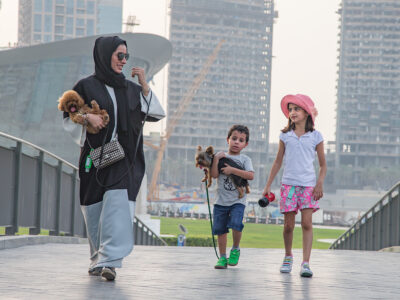Wages are a constant source of discussion among healthcare staff. But what’s the reality for those working in the Gulf?
Pay is a crucial factor in everyone’s working lives. It drives people to work harder, to perform better and tempts many people from the developing world to travel far from their homes and families for the promise of a more affluent future.
For years the mere mention of going to work in the Gulf has instantly rung up dollar signs in the eyes of healthcare workers across the globe. But a recent survey by Gulftalent.com found, for the fourth year running, those working for private healthcare providers in the region received the lowest annual pay rise compared to other industries.
When an opportunity opens up they grab it because the pay is incomparable if you go abroad.
Healthcare staff saw their wages increase by an average of just 8.1% during 2007, while the Gulf average was 11.4%. MT’s own salary survey carried out during the past four months also revealed that pay scales are not as high as many people expect. Especially in relation to the rising cost of living in countries such as the United Arab Emirates [UAE].
The survey drew 177 responses from those working in a wide variety of roles from consultants, to nurses, allied healthcare professionals, pharmacists, managers, IT and administration staff – in both the public and private sectors.
Almost three-quarters believed their pay was too low, with those from Asia and Africa citing their nationalities as the key driver for poor wages, which they said failed to reflect their experience and qualifications.
Findings show that 100% of responders who cited their pay as AED5,000 [US$1,362] or below per month, were from the Philippines, India, the Middle East or Africa. One Lebanese general practitioner revealed he was earning just AED5,000 [$1,362-2,722] per month, despite having 15 years worth of experience.
In contrast the majority (55%) of those earning AED35,000 [$9,530] and above per month were from Europe or the US, with the remaining 45% hailing from India and the Middle East.
The results are corrborated by healthcare recruitment firms. According to an agengy in London, doctors with at least four years worth of experience in the UK or the US could earn anything from AED45,000 to 60,000 [$12,252 to $16,336] per month.
Whereas doctors and nurses from the Philippines, who are required to have two years of experience before they can work abroad, would be lucky to get more than AED5,000 [$1,362], say their counterparts in Manila.
Money talks
What the pay disparity boils down to is the simple economics of supply and demand. Filipinos are falling over each other to work in the Gulf because even the lowest wages are way higher than what they can earn at home, explains Immenuel Jay Avelino, media relations officer at recruitment agency Jobs Dubai, in Manila.
“The salaries Filipinos are getting for working in the medical professions in the Middle East from your survey are around $1,300 per month. In the Philippines they are paid about $300, so that’s a big difference. When an opportunity opens up they grab it because the pay is incomparable if you go abroad,” Avelino says.
Some Gulf countries make no bones about the fact that pay scales vary depending of a person’s country of origin. In Saudi Arabia it is the norm for Filipinos to be paid less than nationals, acknowledges Bodthyna Murshid, assistant professor at the school of nursing at King Saud University of Health Sciences, Riyadh.
A Saudi nurse graduate will be paid SR3,000 [$800] more a month than a Filipino nurse, regardless of their qualifications and experience, she tells MT. “The Filipino nurses are underpaid. They get SR5,000 to 7,000 [$1,333 to $1,866] a month compared with Saudi graduates who get SR10,000 [$2,666]. But with the exchange rates it is still good for them,” she adds.
Although healthcare workers from poorer regions of the world will flock to places where higher salaries are on offer, there’s no incentive for staff from high paying countries to do the same.
In view of this, recruiters obviously have to offer those from developed healthcare systems such as Europe and the US at least the same or even higher salaries, reasons James Buchan, a professor in the health faculty at Queen Margaret’s University in Edinburgh, UK, and an expert in international healthcare recruitment.
“Recruitment practices target a region or countries in other parts of the world where salaries are variable to their own. In well developed countries they have to protect pay to attract people from that market, but in places where pay rates are lower, they can exploit the natural advantage,” he says.
Living on the edge
When healthcare workers from developing parts of the world arrive in countries such as the UAE, however, they are often in for a shock. Because what they thought were excellent wages turn out to be low in comparison to the cost of living, Avelino adds.
“People do not realise that. In their minds they want to get out of the country and earn dollars. And then they go there and find out that the cost of living is really very high,” he adds.
The reason these workers stay in the Gulf has to do with the Filipino culture of putting up with being treated badly, as long as they can earn enough money to send home, Avelino explains. “Filipinos have the attitude that no matter how high the cost of living is, I will try to budget and send a small amount of money back home.”
The only reason people go back to the Philippines is because they miss their families – not because of their situation.”
Ironically though, the rocketing costs of living in the UAE spurred by shortages in accommodation, could start to have an impact on the successful recruitment of medical personnel from Western countries, warns Pippa Baxter recruitment manager for Pulse International, based in London.
“For people working in the Middle East, nine times out of 10 they are going for the money,” Baxter says. “But it will be really interesting over the next few years as demand for nurses and doctors rises, if they will still go to the Gulf if they are not going to earn that much because they are paying so much for accommodation.”
Abu Dhabi has already increased its pay scales for staff coming from the UK to account for the high cost of housing, and to attract medical personnel who have traditionally been attracted to Dubai, for its more relaxed attitude to Western lifestyles, she adds.
As a result a charge nurse with UK or US training can expect up to AED16,000[$4,355] in Abu Dhabi, compared with between AED12,000 and 14,000[$3,266 to $3,811] a month in the emirate of Dubai.
It’s not all down to recruiters making the most of the global economics, though. It’s also true that those from more developed countries are more likely to have had high quality, regulated education and to have worked in the most advanced healthcare environments, Buchan says.
“There is a lot of variation in education in the Philippines, for example, there are some that are good and some that are clearly not,” he reveals. “So that does mean you can not assume the paper qualification means the same thing across the world.”
Equal pay for equal work
The salary disparities in the Gulf, however, and the rising cost of living are having a negative impact on all staff groups. A total of 70% of responders to a question on resigning in MT’s survey said they were thinking of leaving, with many citing Canada and Australia as their dream destinations for pay and career prospects.
Gulf countries will have to address the issue of low pay sooner rather than later, if they want to ensure they retain the staff needed to deliver quality healthcare, in a world wide climate of increasing healthcare staff shortages, Buchan warns. “If the intention is to drive up standards and quality, you need to be looking at developing human resource strategies that support stable work forces,” he says. “High turnover of staff adds costs and undermines quality of care.”
The issue of retention, especially among nursing staff from developing countries, is already a recognised problem in the UAE and Saudi Arabia. It is common for nursing staff from the Philippines and India come in on two to four year contracts and then applying for jobs in the US, Canada and the UK as soon as their contract expires.
The reason more developed countries are the desired destination for lower paid workers is that it is illegal for them to be paid on account of their race. By law, pay must reflect the qualifications and experience required to do a specific job – regardless of the employee’s home nationality.
The UK’s National Health Service has made huge strides in the past four years to ensure that everyone enjoys the same benefits regardless of country of origin or professional role. Under the Agenda for Change pay scheme introduced in 2006 wages are fair, not only within the same profession, but across different professions too.
It is a move the UAE’s Ministry of Health [MoH] is looking to follow. It is already in the process of developing suggested pay scales for staff working across its 14 hospitals and affiliated clinics. The scales will set out minimum and maximum salaries for all staff in line with educational criteria, according to the CEO of institutional services Dr Salim Al Damarki.
“The MoH is evaluating the pay scales and regulating the criteria for pay,” he tells MT. “We are not just going and say this high and this low, you have to go through criteria and have regulation.” But the MoH will not be able to force all facilities to follow the pay banding, he adds.
However, moves are also taking place on an international level to improve fairness of pay for healthcare workers. The World Health Organisation is currently consulting on a code of conduct for international recruitment, which calls for ‘fair and equitable’ treatment in terms of wages and training opportunities.
In the mean time, Avelino predicts, that healthcare staff from developing countries will continue to flock to the Gulf for work. “It is hard work, but they will do everything it takes and will try not to surrender to bad feelings – just get the money.”







